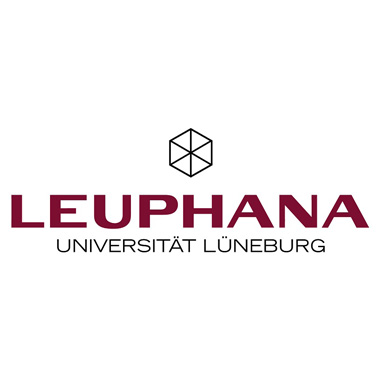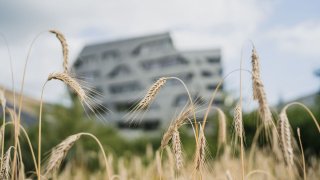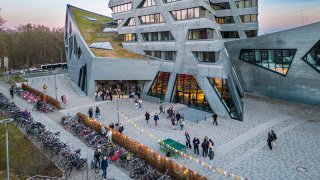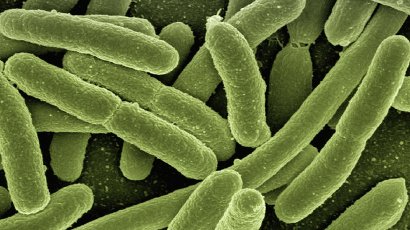Sustainability Science: Resources, Materials and Chemistry (M.Sc.)
Kurzbeschreibung
Several billion tons of chemical products and materials are produced per year. These products can enable our high standard of living and health. While these products offer benefits, their production and use also pose complex and severe impacts on the planet. Essentially, there is a critical need for greener, more sustainable chemicals, materials and products to address these challenges responsibly. Chemistry both as a science and an industrial sector can transform matter, being key to change the material basis of societies towards more sustainability. The production and use of chemicals, materials, and products significantly impact downstream users and have complex implications for the planet, human welfare, justice, and health, both positively and negatively. To address these challenges, a move towards greener chemicals, materials, products, and their more sustainable application is necessary, offering effective solutions to the needs of humankind and societies in a responsible manner. At the same time, achieving sustainable development requires a reduction and transformation of resource use and material flows.
Vollzeitstudium
In a full life cycle and systems thinking the significance of resources, material flows and chemical products in various sectors as industry and in society is set out at the earliest stages of this Master Course. After successful completion students will be able to understand the resources required for a particular product, related issues as well as possible alternatives, including non-chemistry-based alternatives such as alternative business models. Students will learn how to contribute to long-term sustainability. This requires to be familiar with metrics for greenness and sustainability assessment, (e.g., E-factor or life cycle assessment), benign design of chemicals, materials, products and processes such as recycling and sustainable separation and circularity in the scope of sustainable chemistry as a background, aligned with vanguard references, as well as relevant legal regulations and directives.
Thus, concepts of sustainable chemistry along the full life cycle of chemical substances, materials and complex products will be explained, highlighting the importance of resources and their extraction, opportunities and limitations of green chemistry, materials and products, specifics of renewable (i.e., bio-) and non-renewable ressources (e.g. metals and other chemical elements) including their flows, recycling, loss of resources by dissipation, safe and sustainable by design, and other topics such as new business models, international substance, material, and chemical management.
Proof of 60 ECTS in Chemistry, Chemical Engineering, Chemical Process Engineering, Teaching Chemistry, Materials Science, Pharmacy or other.
Proof of sufficient knowledge of English.
Semesterbeitrag: ca. 320€¹
In this course, common foundations of natural and social and sustainability sciences as well as ethics and economics are provided in the first semester’s starting modules, as Sustainability Science, Transdisciplinary Methods together as an introduction to the concept of Sustainable Chemistry and Green Chemistry looking at Resources, Chemicals, Materials, Products, Recycling and related international regulations.
In the following two semesters, modules related to LCA and Non-Renewable Resources, Renewable Resources, Circularity and Recycling, and Benign by Design will deepen and add to this. The students can select elective modules to further specialize in their individual disciplines according to their interests. The fourth semester will be dedicated to developing, writing and defending the Master's thesis.
Quelle: Uni Lüneburg
In a challenged and increasingly complex world, chemistry plays a key role to promote sustainable development, especially focusing on resources, chemicals, materials, products, their flows, processes, and end of live issues. Such knowledge will be indispensable for the transition to a sustainable future including the necessary transformation of the related industrial sector itself. Professionals with disciplinary, inter-, and transdisciplinary background related to both chemistry and sustainability at the same time are urgently needed and thus have a wide range of career options open to them – in research, in institutions and non-governmental organizations, politics, public authorities and businesses - even beyond chemical industries, and in related fields.
Quelle: Uni Lüneburg
Applications for the Master Sustainability Science: Resources, Material Flows and Chemistry at the Leuphana Graduate School can be made easily online. The application deadline is June 1st for the winter semester (October).
Apply here!
Quelle: Uni Lüneburg
Videogalerie

Du hast Fragen zum Studiengang? Deine Nachricht wird direkt an die Studienberatung weitergeleitet.
Standorte
-
Standort Lüneburg
Uni Lüneburg
Universitätsallee 1
21335 Lüneburg
Vollzeitstudium









